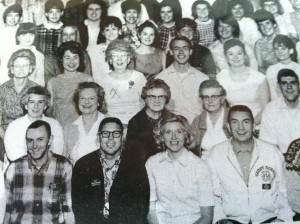When you’re climbing a mountain, it’s vital that you stop along with way and compare your location with the map. You do this by using your map, compass, altimeter, and line of sight. Occasionally you’ll find that you’re off course and when that happens its vital that you make your adjustments lest you find yourself precisely where you don’t want to be, which is in the land of the lost and clueless.
The same thing is true in life, and I find that there’s no better time to take stock of where I’ve been and where I’m going than the time at the end of year. This is because years are markers, in similar ways that ridge lines, or meadows, or streams are markers on our journey to the summit. It’s good – very good – to consider where we’ve been, where we’re going, and whether we’ve strayed from our intended purpose. If we have, it’s vital that we get back on track.
If all this sounds like a completely foreign language to you because you’re not a ‘goal setter’, I’ll simply quote Socrates, who said that “the unexamined life is not worth living”. To live by simply reacting to what comes our way is to hike without a destination. The good news about not having a destination is that you’re never off course! Without a destination though, I promise you that you’ll fall far short of the life that could be lived. We simply take some time and ask ourselves, prayerfully, where we’re meant to go. We do this by asking some important questions – and it’s perhaps best done in conjunction with your spouse, or a close friend or two. Here are the questions and exercises that I find most helpful.
1. What are the main gifts God has given me? The Bible says that each of us is endowed, uniquely, with gifts, or we might say, “unique talents” which are intended to be used in service to our world. Remember that God created Adam and Eve to be image bearers, charged with making God’s character visible in the world. Each gift God has given His followers is given in order that we might do that very thing. Some are exceptional in serving those on the margins, some in giving, some in showing mercy, some in teaching. There’s an entire list of gifts discussed in the Bible here and here. If you know your gift(s) great! We’re encouraged to use them, and this means that I need to make time in my week to develop these gifts and exercise them. Practically speaking, knowing that I’m gifted in teaching and writing means that these things are higher priorities in my life than skiing and climbing, as much as love the latter two!
2. How can I “move the ball down the field” in my area of giftedness? I’d suggest that you set a maximum of two goals here because too many options scatters your attention and sets you up for failure. For example, I’m increasingly interested, as a teacher, in teaching others how to teach. So, I’m setting some goals that will help me expand my skills and capacities when it comes to ‘teaching others to teach’.
3. Develop goals related to your main roles. In addition to our gifts, each of us have roles in life: parent, employee, spouse, student, etc. I find it extremely helpful to develop goals related to each of our significant roles. How am I going to foster intimacy with my children? How am I going to improve my skills for work? How am I (or we, if you’re a couple) stewarding all that’s entrusted to us? What initiatives should we take this year in order to fulfill our calling to be a blessing? In my case, I have goals related to my roles as parent, spouse, leader, and teacher.
4. Self-Care. This might sound a bit narcissistic, but it’s not. Paul’s prayer is that each person would prosper in the body, soul, and spirit. This kind of prosperity doesn’t happen without our participation, as we seek to intentionally steward each of these three parts of ourselves, in order that we might live well. In this realm, it’s best to work at developing habits. Here’s an example of what I mean:
Spirit. I’ll enjoy coffee with God each morning, as I read from a daily devotional and pray for the day. My reason for this pursuit is intimacy with Jesus, believing that all that is good and life-giving will flow out from such intimacy.
Soul. I’ll be fed by beauty through creation, music, and film, seeking to enjoy each element thoughtfully.
Body. I’ll increase my servings of fruits/veggies to six per day, and continue my exercise routine so that I might have energy for each day, and be able to enjoy outdoor activities with friends and family.
This little exercise takes time, but I’m convinced that it pays big dividends because whether we’ve only one free hour a day, or the freedom to build our entire daily schedule, what matters (as Gandalf so wisely says) “is what we do with the time we’ve been given.” I don’t have tomorrow to live well, joyfully, purposefully, out from intimacy with my creator. I only have today. So it’s best if my day is spent moving in the right direction, and getting there requires some prayerful planning.
NEXT: tools for the journey. In my next post I’ll share a book, and an online tool that will help you translate your goals into daily action and habits.
What do you think? Why is goal setting so hard? What steps have you found to be helpful?











